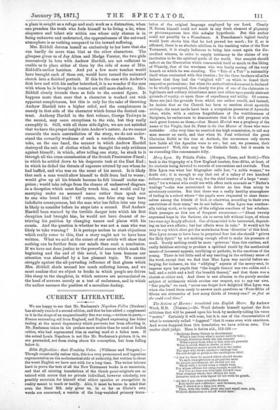Bible Difficulties : their Teaching Value. (Williams and Norgate.) — Though
occasionally rather thin, this is a very pronounced and ingenious argumentation on the ecclesiastical side of authority, but written in about the worst English we have met with for a long time. The writer labours hard to prove the text of all the New Testament books is so uncertain, and that all existing translations of the Greek quasi-originals are so tainted with errors that no private individual, however scholarly, can possibly ascertain for himself what either apostles or evangelists in reality meant to teach or testify. Also, it must be borne in mind that even the Sinai MS. only gives us, in so far as Christ's own words are concerned, a version of the long-vanished primary trans- lation of the original language employed by our Lord. Clearly M. Renan himself could not touch in any fresh element of piquancy or picturesqueness into this nebular hypothesis. But this author could not possibly be a Frenchman. A Frenchman's logical faculty would have shown him that he had proved too much ; for if, as is affirmed, there is an absolute nihilism in the teaching value of the New Testament, it is simply ludicrous to bring into court again the dis- credited witness, in order to supply testimony to the Oki= of any institution to be the spiritual guide of the world. Our essayist should reflect on the illustration which commended itself so much to the liking of Whately, that of the woodman who was busily sawing off the very branch on which he was standing. The "Tale of a Tub" is rationality itself when contrasted with this treatise ; for the three brothers all alike believe that they had the "original will" on which to found their respective pretensions ; but when the authoritative document is declared to be wholly corrupted, then clearly the plea of one of the claimants to legitimate and solitary inheritance must rest either upon purely abstract grounds of equity, or upon those of expediency and utility. Of course, these are just the grounds from which our author recoils, and instead, he insists that as the Church has been so careless about apostolic writings, she must needs have been a scrupulous preserver of Apostolic ideas, while, with a curious forgetfulness of the worthlessness of Scripture, he endeavours to demonstrate that it is still pregnant with such great lessons as these,—that Mount Horioth was a prophecy of the name of the Virgin, that St. Peter is the One Master of those who were forbidder dthe very time he received the high commission, to call any man master on earth, and that when St. Paul withstood the great Christian Rabbi to the face at Antioch, the occurrence only shows how liable all the Apostles were to err ; but not, we presume, their successors ? Well, this may be the Catholic faith ; but it sounds to us exceeding like consummate folly.


































 Previous page
Previous page